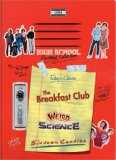| Reviews & Columns |
|
Reviews DVD TV on DVD Blu-ray 4K UHD International DVDs In Theaters Reviews by Studio Video Games Features Collector Series DVDs Easter Egg Database Interviews DVD Talk Radio Feature Articles Columns Anime Talk DVD Savant Horror DVDs The M.O.D. Squad Art House HD Talk Silent DVD
|
DVD Talk Forum |
|
|
| Resources |
|
DVD Price Search Customer Service #'s RCE Info Links |
|
Columns
|
|
|
High School Flashback Collection (Sixteen Candles/The Breakfast Club/Weird Science)
THE MOVIES:
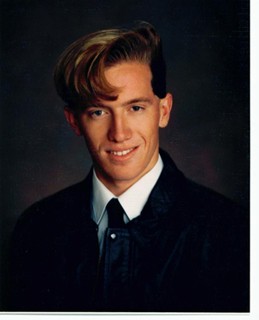 Yup, the photo you see here is of your humble reviewer, ca. 1989. I know, very hot, very hot. This was my senior year in high school. I actually hunted around for my earlier yearbooks, when my photos show me refusing to smile because I had braces, but alas, they are buried somewhere in my closet and I can't get to them. I was a John Hughes junkie for many years by the time this photo was taken, and much to my chagrin, people always told me that I looked a little bit like Anthony Michael Hall. That's right, in high school, I was Farmer Ted.
Yup, the photo you see here is of your humble reviewer, ca. 1989. I know, very hot, very hot. This was my senior year in high school. I actually hunted around for my earlier yearbooks, when my photos show me refusing to smile because I had braces, but alas, they are buried somewhere in my closet and I can't get to them. I was a John Hughes junkie for many years by the time this photo was taken, and much to my chagrin, people always told me that I looked a little bit like Anthony Michael Hall. That's right, in high school, I was Farmer Ted.
There is hardly anyone in my age group that did not have a serious jones for John Hughes. I started seeing his movies in junior high, and since they largely showed what life in high school was alleged to be like, they made me actually yearn to be older. The kids in the films dressed the way I wanted to dress, and as I would come to discover, listened to a lot of cool music. Weird Science introduced me to Oingo Boingo, and the number of bands that would become all-time favorites that could be traced back to the Pretty in Pink soundtrack is rather impressive. It sounds a bit cliché to say so, but John Hughes was making movies about the lives of myself and my friends. The look of them and the conventional narrative structure might have been more of what we wanted than what we had, but underneath all of the slapstick and the Hollywood romance, the adolescent problems that were Hughes' stock in trade were very real. All of John Hughes' perennial '80s output has been on DVD before, with just about all of his teenage sextet having had two or three editions already. The basic trajectory of these has been a cursory early release, a slight upgrade later, and then, unfortunately, in the case of some of the later Paramount titles, stripped down to fit in their barebones "I Love the '80s" series. Luckily, Universal is not pulling the same shenanigans, and instead, their new High School Flashback Collection continues to improve the treatment of John Hughes on DVD. These three movies--Sixteen Candles, The Breakfast Club, and Weird Science--were previously packaged together as the Brat Pack Movies & Music Collection (complete in three-ring binder and with a music CD) in 2005, which was actually a repackaging of the 2003 High School Reunion Collection. Those versions featured a fairly solid audio/video presentation that appears to be exactly the same in this new Flashback box, so what sets this 2008 release apart is the fact that, at long last, these classic comedies have special features to take fans back in time to try to figure out why these movies have stuck around for so long. I worked in a video store between 2004 and 2005, and believe me, these movies have indeed stuck around. They were rented more often by teenagers than they were nostalgic adults. John Hughes had an understanding of the basic social structure of teenage life, as well as the recurring problems of puberty, and this has managed to keep the films from growing dated. Even the often bizarre fashion is stylish enough to still look modern. Molly Ringwald's wardrobe would fit snugly in the closets of the ladies on Gossip Girl (though they'd end up being some of the more tame selections). The Hughes vision arrives fairly well formed in his first feature, Sixteen Candles (1984). He was already aware of how teens were ranked by age and coolness, and how the enforced social system that we call "high school" put every conceivable type together in one location and locked the doors for eight hours a day. Thus, the more of these types represented in his films, the more his audience would find themselves in them. Girls could dream of being Molly Ringwald, and of chasing the Jake Ryans of the world, even if most of the boys they knew were Farmer Teds like me. Hughes usually gave Molly what she wanted, but he also always rewarded the Teds, too. The nerds invariably have a blonde waiting for them at the end. I'm still waiting for mine. No, I'm not bitter. Why do you ask? In Sixteen Candles, Ringwald plays Samantha Baker, who has the misfortune of having her sixteenth birthday the day before her older sister's big wedding. With all the hustle and bustle around the bride (Blanche Baker), with in-laws to meet and grandparents visiting, Samantha's family all forget about her special day. That's depressing enough, but it's becoming totally clear to Samantha that Jake Ryan (Michael Schoeffling) doesn't know she's alive, and rather than having him notice her at the school dance, she's being followed around by Ted the Geek (Hall). Of course, since this is a romantic comedy, Jake actually has started to notice Samantha, and if she only realized, happiness would be theirs. Sixteen Candles basically takes place over 24 hours, from the morning of the birthday, through the dance that night and the party at Jake's that follows, to the denouement at the chapel. Within the movie's brisk 93 minutes, first-time director Hughes manages to chart the course of the Ted-Samantha-Jake triangle, follow family-related wedding activities on the home front and Samantha's birthday woes, and also take multiple detours into over-the-top comedy, including the infamous, oft-debated presence of horny foreign exchange student Long Duk Dong (Gedde Watanabe). He handles them all with a masterful confidence, giving none of the story elements short shrift. Sixteen Candles is as funny as it is romantic, a coming-of-age story on multiple levels as well as a randy party movie. It's got a model ensemble cast where multiple actors get to shine, but with Hughes never letting them outshine his two impressive finds, Molly Ringwald and Anthony Michael Hall. As far as teen comedies go, Sixteen Candles is the gold standard. Though, I will say that the movie has some darker overtones than I had remembered. Jake Ryan may be the iconic dreamy hunk, but it's a little strange now seeing him send his completely drunk girlfriend off with Farmer Ted, seemingly okay with Ted doing what he will with her. I am also, of course, more sensitive to the portrayal of Long Duk Dong and his ever-present Chinese gong; yet, I also noticed more how the character seems to be purposely playing into the expectations of his hosts, pretending to be meek when around them, and these expectations poke as much fun at the Americans who have perpetuated the Asian stereotypes as the character sucks Hughes into the catch-22 of perpetuating them himself. The danger of these kinds of elements, risking being offensive, is also part of why Hughes' films are so appealing. Most teenagers like things to be a bit daring, to have entertainment that doesn't talk down to them while also having material that parents might disapprove of. This is why recent films like Juno and Superbad have worked so well, also finding an audience beyond the age range of the characters by pushing the risky bits even further. Hughes wasn't as in-your-face about his edginess, but there is plenty in Sixteen Candles to make your mom blush, from jokes about menstruation and birth control pills, to Farmer Ted's more scandalous come-ons and, of course, the epic nude shot of Caroline in the shower that most boys remember forever despite its rather brief length. (Alas, a downside to DVD extras is discovering that Haviland Morris used a body double. Those are not the boobs we thought they were!) Hughes gains his audience's trust by accepting that a teen's problems are real and that sanitizing them for the screen won't fool anybody. For his next film, The Breakfast Club (1985), Hughes would hone his perception of the class structure of high school into a perfect diamond. Like a version of Sartre's No Exit set in high school detention, The Breakfast Club brings together what Hughes saw as the five iconic "types" that make up any high school: the brain (Anthony Michael Hall), the athlete (Emilio Estevez), the basket case (Ally Sheedy), the princess (Molly Ringwald), and the criminal (Judd Nelson). All five have gotten into trouble for various reasons, and all five have been assigned a special Saturday detention. Though none of them are friends going into it, they do all carry their preconceptions and have relationships that exist based on those lines. Over the course of their incarceration, they will cross those lines, get to know one another, and eventually reveal who they are based on what lead them to that room in the first place. The Breakfast Club is deftly constructed, setting up its thesis right from the start with Anthony Michael Hall's voiceover about the categories the group feels they have been put in, and then promising to break those down. Hughes looks for the truth in those categories and builds real characters that conform to them while also being rounded out enough to bust the conventional wisdom about each. He starts with the outer trappings--the clothes they wear, the food they eat--and expands from there to show that these accoutrements bolster the outer masks--Judd Nelson's bravado, Emilio Estevez's machismo, Ally Sheedy's freakish demonstrations. These masks inevitably clash, but each time they do, a piece breaks off. Though each character lies about themselves, the fact that they demand honesty from the other students means they eventually have to own up, too. The bonding happens slowly over the course of the day, bolstered by their common situation and their common enemy, the principal stuck watching them (Paul Gleason). Arguments and pranks lead to deeper conversations, and it becomes clear that all the kids have real problems, and that most of those problems stem from the same insecurities about who they are, where they come from, and where they are going. The last of the barriers break down in an emotionally intense scene that begins lightly, with the five enjoying their buzz after smoking out, but Hughes isn't content with an easy bonding session. Again, it's all about respecting the characters and the age group he's portraying, acknowledging their problems are real and not to be solved by the easy platitudes of an After School Special. Hall's character, Brian, asks if anyone will actually say hello to him in the halls on Monday, and the truth, as it often does, hurts. Once the honesty starts, though, there is no stopping it, and it paves the way for some final transformations that we might otherwise find unacceptable. Hughes leaves himself the escape clause that it might all be another ruse. The ensemble cast here couldn't be more perfect. Hughes really was a genius of casting, and he gives his actors enough room to explore that they all invest their roles with authentic pathos. Every viewer enters the movie with a preconceived allegiance to one of the five but then leaves with sympathy for all of them. Judd Nelson has the showiest role, and he tears it apart. It's sad that he never had another role to quite match it. Ally Sheedy proves herself to be the most inventive of the cast, having the weirdest character to play and quietly indulging in all sorts of comedic business. Even when she is saying nothing, she is always lurking about, always watching. As the compulsive liar, she sees through everyone's images first, and being the true outcast, has no social consequence to face by drawing them out--except having to be social herself, the greatest and most subtle transformation of them all. (Well, pre-Extreme Make-Over.) 1985 also saw John Hughes go for broke in the last movie of the set, a bonafide teensploitation classic, Weird Science. Eschewing the heavier social drama to go more toward the screwball and slapstick humor that ran through Sixteen Candles, Hughes decided to have fun with genre and play around in the National Lampoon style he started out in. Weird Science is like Animal House funneled through the golden age of Universal horror, with a little nod to the Australian school of post-apocalyptic movies. He still has a moral, encouraging his young charges to believe in themselves and not worry about how they are perceived, but he doesn't let it get in the way of his good time. Anthony Michael Hall returns for a third time as Gary, and watching him over these three movies is pretty entertaining. Hughes tracks the actor through puberty, and it's hard to believe the guy in Weird Science is the same scrawny Farmer Ted, with barely two years between. In this film, he's partnered with fellow nerd Wyatt (Ilan Mitchell-Smith, The Chocolate War). The two are social misfits with romantic souls who are tired of the humiliation suffered at the hands of bullies (Robert Rusler and a very young Robert Downey, Jr.) and the loneliness of their Friday night sleepovers. Inspired by the airing of Bride of Frankenstein they catch on TV, the guys decide to make a woman of their own, hacking into government computers and utilizing all kinds of technology that only existed in 1980s movies, when we all believed computers could do anything. The result is Lisa (Kelly LeBrock), every teenage boy fantasy wrapped up in a half-shirt and lycra panties. Over the course of the weekend, Lisa will teach the boys to loosen up, alter their social status, and get them girlfriends. And she'll look damn good doing it, too. The humor in Weird Science is as lacking in sophistication as its story is lacking in plausibility, but the movie's audacious confidence practically dares you to care about such things. Lisa's message to the boys is there for the audience, too: you can get all bent out of shape about the ridiculous things that are happening, or you can unclench and live a little. I choose the latter, and Weird Science makes me laugh every time. It's that movie where I am the obnoxious friend that knows all the lines and can recite them ahead of the actors. You don't know how excited I was when a friend of mine started dating a dude named Chet. I couldn't wait to ask him why he had to be such a wanker! Hall and Mitchell-Smith are a fabulous duo. They have an unpolished geeky quality that lets average teenage boys imagine themselves in their shoes. Hughes runs them through all of the crazy things guys would get up to with the unlimited resources of a magical science girl, from going to bars to driving fast cars to saving the day from killer mutants. The guys mug for the camera and toss out off-hand one liners, trading bits of dialogue with smooth comic timing. Kelly LeBrock is also very good, completely comfortable in a role that doesn't require her to be down-to-earth at all, adapting to every situation with the same cool demeanor. It's hard to believe that Lisa would go on to marry Steven Seagal, but hey, everyone makes mistakes. She was just so heartbroken about being dumped by Gary and Wyatt, the rebound required a double-sized DB. THE DVD Video: Sound: The 5.1 mixes are lively and full of detail. Given the dual importance of John Hughes' dialogue and his carefully chosen music cues, a clear interplay between the two elements is essential, and fans of these films will find that the studio delivers on this front. Note that in the past there has been some controversy regarding missing dialogue in Weird Science. Specifically, when Gary and Wyatt are first designing Lisa, there is a slight bit more in the jokes regarding breast size. This new release matches earlier Universal releases and those lines are still missing. (Some argue over when the lines got cut, many tracing back to their memories or even checking early VHS copies that apparently did not have them, whereas a 1998 DVD from Image Entertainment allegedly did. I honestly have no idea.) Extras: All three of the movies now have bonus features where previously there were none, with each getting a retrospective documentary and some getting a little bit more (The Breakfast Club has the most, Sixteen Candles the least). These are all decent and entertaining, though not always terribly insightful. One can only wonder what might still be in the vault were Universal to go digging. Is there nothing from the cutting room floor? Nothing letting us peek behind the curtain? I assume this is at least partially due to John Hughes himself, who has, as far as I recall, only ever participated in the commentary on the 2000 Ferris Bueller disc and has not appeared on any other DVDs for his movies. Sixteen Candles has a documentary about the movie broken into eleven short parts that can either be watched individually or separately. Through interviews with the cast and admirers like Juno-scribe Diablo Cody, Hank Stuever of The Washington Post, and Heathers-director Michael Lehmann, the featurettes explore the making of the film as well as its lasting impact. Of the main cast, neither Ringwald or the reclusive Schoeffling, who quit acting shortly after this movie, are present, though Anthony Michael Hall is. Also featured are Paul Dooley, Blanche Baker, and Justin Henry (Samantha's father, older sister, and little brother, respectively), Gedde Watanabe, Haviland Morris (Jake's girlfriend, Caroline), and John Kapelos (the guy marrying Samantha's sister). Hughes is not involved either, but even without him and his romantic leads, "Celebrating Sixteen Candles" is a solid retrospective, if largely built on surface nostalgia. (38 minutes) The Breakfast Club is the only disc to have a feature commentary, with actors Anthony Michael Hall and Judd Nelson sitting down with the DVD extras producer to reminisce about the movie. They share quite a bit of information about the filming, from the on-set antics to what hindsight and experience allows them to now appreciate about the thematic structure. Both sound genuinely affectionate about being a part of this landmark film, which was also a high point in their young lives. The track has some gaps in it, but is otherwise quite entertaining and informative. The documentary approach established on Sixteen Candles continues here, gathering Nelson, Hall, John Kapelos, and Ally Sheedy together for a 12-part program called "Sincerely Yours" (51 minutes), and it's definitely the most in-depth featurette of all the discs here. Costume designer Marilyn Vance also joins the discussion, Cody, Stuever, and Lehmann return, and we get more critics and famous fans, like Marco Siega, director of Pretty Persuasion and Amy Heckerling, director of Clueless. Many topics are discussed, including music, language, the characters and the people who played them, etc. Some info is repeated from the commentary, but it doesn't matter. Even with so many notable absences (just like on all the DVDs), the material provides great insight into the movie. There is also a touching tribute to the late Paul Gleason. "The Most Convenient Definitions: The Origins of the Brat Pack" (5:35) takes a look at the wave of young actors, many of whom were in The Breakfast Club, and looks at how they were dubbed "The Brat Pack" by writer David Blum, becoming a manufactured trend. The disc is rounded out with the theatrical trailer for The Breakfast Club. Of the three included in the set, this is easily the best stand-alone DVD. "It's Alive! Resurrecting Weird Science" is the shortest documentary of the pack, with now regular commentators Anthony Michael Hall, Marilyn Vance, and John Kapelos (in this movie, playing the white guy at the blues bar) doing all of the lifting in terms of cast and crew participation. Other commentators we've been getting used to (Diablo Cody, Michael Lehmann, Amy Heckerling) also return, and EW's Owen Gleiberman chimes in. The coverage may be faster paced, but it keeps in the spirit of the movie and gets right down to business. There is also a short section featuring the various actors from all the movies talking about Hughes' coming transition out of directing. Additionally, we get the theatrical trailer for the movie and the wholly unnecessary pilot for the Weird Science TV show--an extra that detracts from the experience rather than adding to it. Where is the Oingo Boingo music video for the title track? Or the video for the Simple Minds theme from The Breakfast Club, for that matter? Those seem like no-brainers. FINAL THOUGHTS:
Jamie S. Rich is a novelist and comic book writer. He is best known for his collaborations with Joelle Jones, including the hardboiled crime comic book You Have Killed Me, the challenging romance 12 Reasons Why I Love Her, and the 2007 prose novel Have You Seen the Horizon Lately?, for which Jones did the cover. All three were published by Oni Press. His most recent projects include the futuristic romance A Boy and a Girl with Natalie Nourigat; Archer Coe and the Thousand Natural Shocks, a loopy crime tale drawn by Dan Christensen; and the horror miniseries Madame Frankenstein, a collaboration with Megan Levens. Follow Rich's blog at Confessions123.com.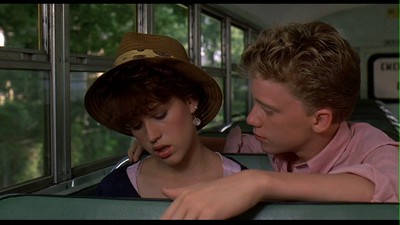
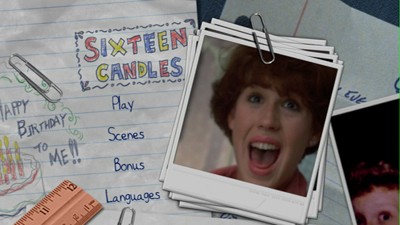
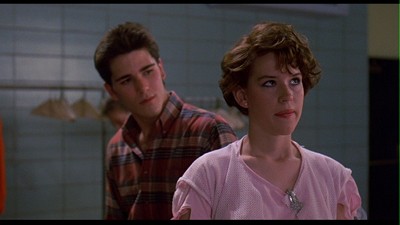
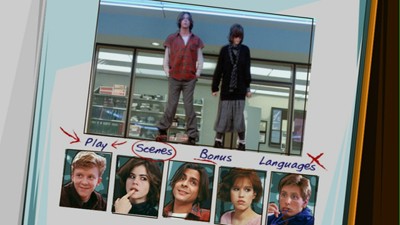
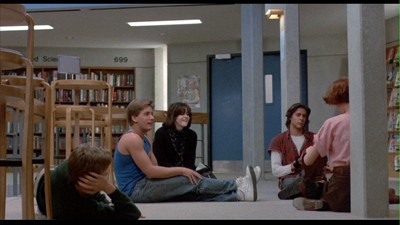
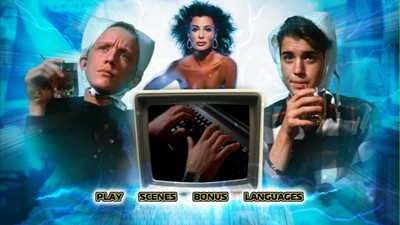
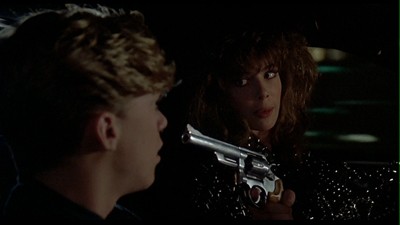
The 1.85:1 anamorphic transfers are the same ones as were featured on the previous 2003 and 2005 releases of these films, which is both good and bad. Good in that these are fairly decent transfers with nice colors, clean images, and largely free of the various digital problems that can plague DVD consumers; bad in that they aren't entirely perfect, they could use a little more adjustment. The Breakfast Club comes off the best, but that's largely because, unlike the other two movies, there are no dark nighttime scenes. In Sixteen Candles and Weird Science, the image tends to run a little dark, making the picture muddier then it should be when the lights go out.
All three discs have multiple audio options to choose from. In addition to the main English tracks, mixing the original soundtrack in Dolby Digital 5.1 and DTS 5.1, there are also dubs in French and Spanish, both mixed in 2.0. All three languages have subtitle tracks, as well, with the English titles being geared toward the deaf and hearing impaired. 
The High School Flashback Collection comes in an embossed tin with a hinged lid made to look like a locker door. Each of the movies come in their own individual plastic cases, likely matching the same cases as they will be in when sold separately. There is also a single-sheet "back cover" for the set that is affixed to the underside of the tin by the shrinkwrapping, though mine didn't have any glue or any other adhesive once the plastic was removed. 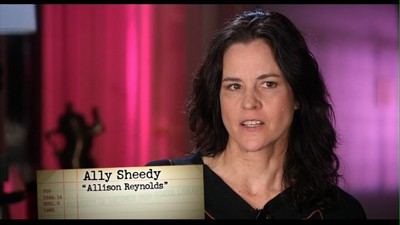
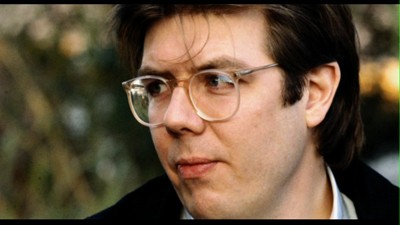
John Hughes
Given the age of the movies in the High School Flashback Collection, one might suspect that the three films would only appeal to folks looking to indulge in nostalgia, but you would be wrong. Despite being mired in the fashion and music of the '80s, John Hughes hit on the timeless truths of teenage angst. Technology has changed, and all of the actors are more than twenty years older than the characters they portrayed, but the problems kids face are still essentially the same. They want to be liked and understood for who they are. This is the underlying theme of all of these films--Sixteen Candles, The Breakfast Club, and Weird Science--and why the dramatic elements still resonates even in a new century. Likewise, the comedy still gets laughs because funny is always funny. Though this is the latest in a long line of repackagings for these films, this is the first with substantial extras. They still don't have everything fans could hope for, but if there is a quadruple dip somewhere in our future, it just means we have a good excuse to watch the Hughes/Universal triptych all over again. Highly Recommended. 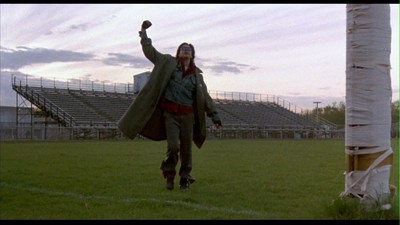
|
| Popular Reviews |
| Sponsored Links |
|
|
| Sponsored Links |
|
|
| Release List | Reviews | Shop | Newsletter | Forum | DVD Giveaways | Blu-Ray | Advertise |
|
Copyright 2024 DVDTalk.com All Rights Reserved. Legal Info, Privacy Policy, Terms of Use,
Manage Preferences,
Your Privacy Choices | |||||||









